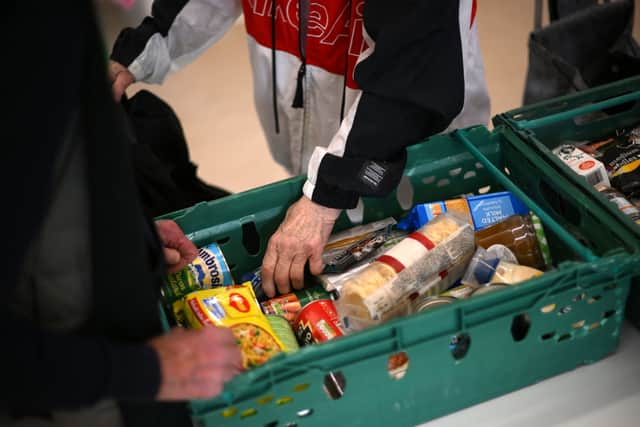Food bank emergency parcels hit record high amid cost of living crisis leading to ‘pressure cooker situation’
and live on Freeview channel 276
Nearly three million emergency food parcels were given out by the Trussell Trust in the past year, its highest ever total.
The number of food parcels for children also topped a million for the first time with the figures from the food bank charity representing a 37% increase compared to the previous year.
Advertisement
Hide AdAdvertisement
Hide AdBrian Thomas, chief executive at South Tyneside Foodbank, said the “unprecedented rise” in food bank users coupled with food donations not keeping up has led to a “real pressure cooker situation”.
A total of 2,986,203 emergency food parcels were given out between April 2022 and March this year.
The number is more than double the amount distributed by food banks in the same period five years ago, the charity said.
Some 1,139,553 parcels were distributed for children, up from 835,879 the previous year and a rise from less than 500,000 in the 2017–2018 year.
Advertisement
Hide AdAdvertisement
Hide AdThe charity said more than 760,000 people used a food bank in the network for the first time amid the cost of living crisis - this is more than the population of Sheffield in the last census and a 38% rise compared to last year.
The Trussell Trust added that the problem is “not a regionalised issue”, with an increase of at least 28% in each area of the UK.
The north east of England saw the biggest rise of people using food banks, with 54% more parcels being distributed compared to the previous year.
The east of England saw the second highest rise after the North East, at 45% followed by the South West at 42%.
Advertisement
Hide AdAdvertisement
Hide AdOf the four nations, Wales had the highest rise at 41%, followed by England at 37%, Scotland at 30% and Northern Ireland at 29%.


‘Extremely concerning’
The charity said it is the case now that the level of need across the network is “far outstripping the donations that we’ve been receiving”, meaning food banks are having to purchase more food themselves and source more warehouse space to store it.
It said food banks are also having to extend their opening hours to accommodate employed people who need to access their emergency support around their working patterns.
The Cost of Living Payments support did result in a temporary dip in need for food banks, the charity said, but the organisation criticised its short-term nature.
Advertisement
Hide AdAdvertisement
Hide AdThe charity’s senior research manager Emma Newbury said: “We see that there is some respite with the cost of living payments but that is short-lived and shows that one-off payments are unable to make lasting difference when people’s regular income from social security and work is just too low for them to be able to afford the essentials.”
The charity is calling on the government to make a long-term commitment that benefit rates will always be enough to afford the essentials.
It is also demanding a long-term strategy for local crisis support and commitment to a multi-year settlement of funding.
Emma Revie, the trust’s chief executive, said the latest figures are “extremely concerning and show that an increasing number of people are being left with no option but to turn to charitable, volunteer-run organisations to get by and this is not right”.
Advertisement
Hide AdAdvertisement
Hide AdShe added: “For too long people have been going without because social security payments do not reflect life’s essential costs and people are being pushed deeper into hardship as a result.
“If we are to stop this continued growth and end the need for food banks then the UK government must ensure that the standard allowance of Universal Credit is always enough to cover essential costs.”
Labour’s shadow work and pensions secretary Jonathan Ashworth said the “devastating” increase in emergency food parcels is the “price families are paying for 13 years of Tory economic failure”.
A government spokesperson said: “We are committed to eradicating poverty and we recognise the pressures of the rising cost of living which is why we have uprated benefits by 10.1% as well as making an unprecedented increase to the National Living Wage this month.
Advertisement
Hide AdAdvertisement
Hide Ad“This is on top of changes already made to Universal Credit which mean claimants can keep more of their hard-earned money – a boost worth £1,000 a year on average.”
The spokesperson added: “We are also providing record levels of direct financial support for the most vulnerable – £1,200 last year and a further £1,350 in 2023/24, with over eight million families starting to receive their first £301 Cost of Living instalment from yesterday – while the Household Support Fund is helping people with essential costs.”
Comment Guidelines
National World encourages reader discussion on our stories. User feedback, insights and back-and-forth exchanges add a rich layer of context to reporting. Please review our Community Guidelines before commenting.
